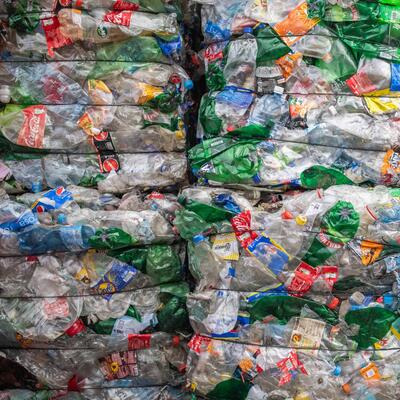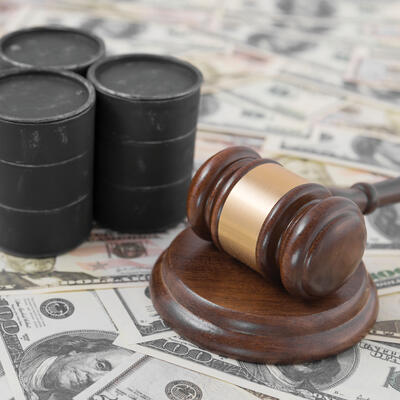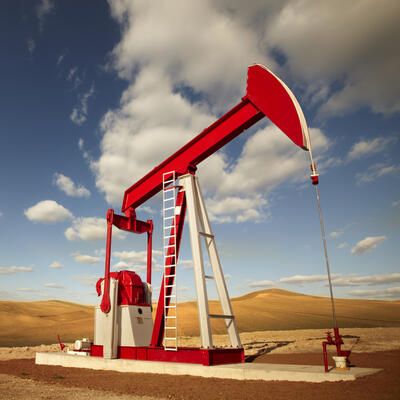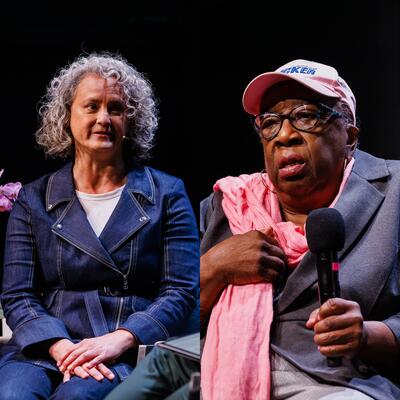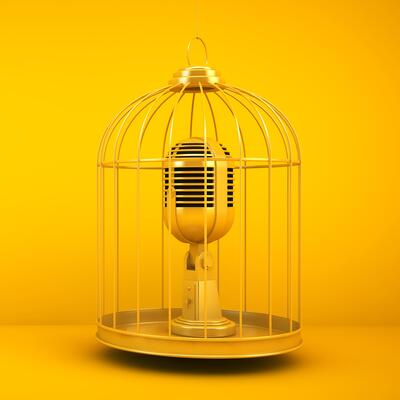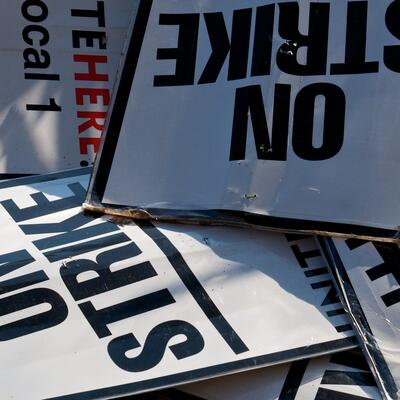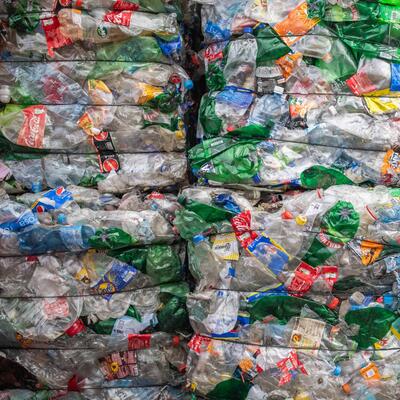
Big Plastic: The New Big Oil
Guests
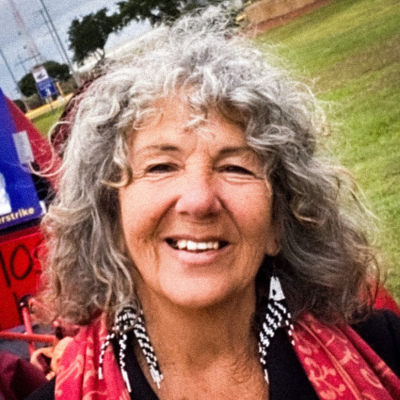
Diane Wilson
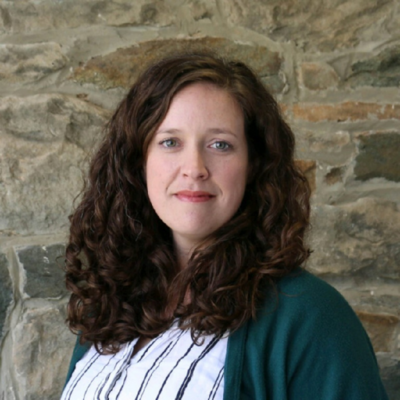
Jane Patton
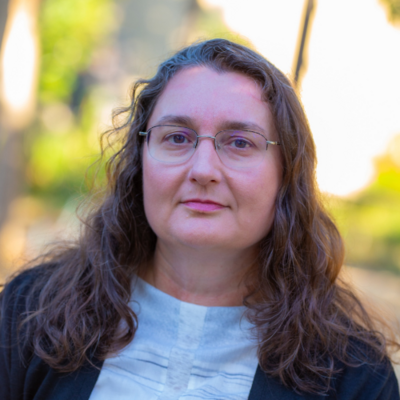
Susannah Scott
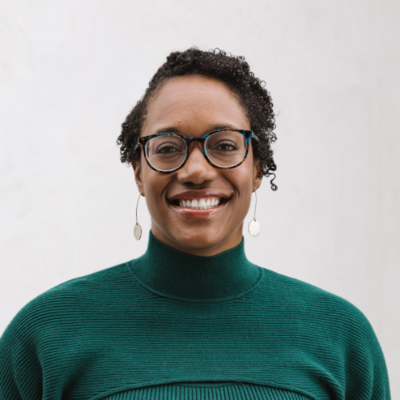
Alexis Jackson
Summary
Plastics are everywhere. Jane Patton, U.S. Fossil Economy Campaign Manager at the Center for International Environmental Law - says, “They're finding microplastics in babies' first poops, which is really dangerous and scary when we consider the full chemical profile.”
Diane Wilson is a lifelong shrimper in the Texas Gulf. When Formosa Plastics built a factory in her small rural community, the county gained the dubious honor of being named the most toxic in the country.
Wilson took on the multinational company. She would kayak around the waters surrounding the factory, collecting pollution and water samples. In the process, “I lost my job. I lost my boat. I lost my marriage. I lost friends. And all because I started watching and fighting Formosa,” says Wilson.
In 2019, a federal judge found Formosa Plastics guilty of being a serial offender of the Clean Water Act. The company agreed to a 50 million settlement and zero future discharge from the plant. But that did not deter the company from its continued pollution. “In the first year [the fine] was $15,000 per day and then it was $20,000, $25,000. Now it's $65,000 per day,” Wilson says. “Since June of 2021, when we really started having a way to monitor their discharge, they have violated it over 600 times and they have been penalized by us over 16 million dollars.”
“To me, the solution is the era of plastic production has to end,” says Wilson.
While the idea that plastics are a blight on our environment is not new, it's becoming clear that plastics are a significant climate threat as well. The production of plastics alone produces about 4% of global greenhouse gas emissions.
Oil and gas companies see that heightened awareness of climate change is creating an existential threat to their fossil fuel profits. And so they are doubling down on the petrochemical side of their business. The Center for International Environmental Law’s Jane Patton says, “We know that the industry has for some time been planning to double or even triple the production of plastics by 2050.”
The industry would like us to believe that recycling is the solution. But only 9% of the plastic ever produced has been recycled. Susannah Scott, chemistry professor at the University of California, Santa Barbara, explains that plastics are not like aluminum cans, which can easily be melted down and formed into new aluminum cans, because aluminum is just one, single element.
“There are hundreds of different types of plastics and they're all mixed together,” Scott says. And “when you reprocess plastics or polymers, these are organic molecules that actually don't like to be reprocessed. when you melt them, when you stretch them again, they break and the difference in the properties of the recycled material is enough to make it problematic to reuse them for the same purpose.”
The United Nations recently held the fourth of five planned meetings aimed at hammering out a landmark international treaty to end plastics pollution. Alexis Jackson, Ocean Policy and Plastics Lead at the Nature Conservancy in California, says, “The pace of global production that we're seeing on plastics warrants global action and alignment.”
Ending plastics production entirely is probably not an option. The medical industry, for example, relies on plastic in countless life-saving devices. And plastic components replacing steel in cars have made them far more fuel efficient. Still, Jackson says, “The solutions that we build have to be feasible and yet still need to be ambitious to ensure that harm, or undue harm, is not done to people and to the environment.”
Episode Highlights
4:17 - Diane Wilson on growing up in a small Texas Gulf community
7:28 - Diane Wilson on the personal cost of going up against a plastics factory
13:12 - Diane Wilson on a meeting with an EPA criminal investigator
18:21 - Jane Patton on the lifecycle of a plastic yogurt cup
22:13 - Jane Patton on the plastics emissions
28:49 - Jane Patton on UN Plastics Treaty
32:02 - Susannah Scott on what makes up plastic
33:19 - Susannah Scott on why plastic is so difficult to recycle
37:10 - Susannah Scott on the challenges of collecting and sorting plastics for recycling
40:35 - Alexis Jackson on how we’ve become so reliant on plastics
45:28 - Alexis Jackson on how the UN Plastics Treaty could factor into our lives
What Can I Do?
Resources From This Episode (4)
Full Transcript
Note: Transcripts are generated using a combination of automated software and human transcribers and may contain errors. Please check the actual audio before quoting it.
Greg Dalton: I'm Greg Dalton,
Ariana Brocious: I'm Ariana Brocious.
Greg Dalton: And this is Climate One. We know that plastics are bad and we do our part to reduce our use of plastic recycling, bringing canvas bags to the grocery store. I have one friend who takes plastic food containers to restaurants, so she doesn't have to get a new doggie bag. She puts her food in that and takes it home.
Ariana Brocious: Wow, that's a commitment. That's, bravo. But there are some places in our lives where we're just stuck using plastic. And the place that this is most apparent to me is when I go grocery shopping. Go into the produce section and everything, it seems like, is wrapped in plastic or you're expected to put it in a plastic bag just to get it to your house. And it makes sense for things like berries, maybe, that are squishy. But when it comes to things like oranges, you don't need a plastic bag for those. Just put them in your cart. And it frustrates me because I feel like I come home with all this plastic that I didn't want, and I don't even have a choice about it. It's just inherent in grocery shopping.
Greg Dalton: Right. When I'm sitting there looking at spinach like, ah, does it really have to come in a box of plastic? And yes, I know there are good uses of plastic, medical equipment, cars, EVs that we talk about, where it provides very useful functions in our lives.
It's just that cheap plastic is such a versatile thing. It's not all the same.
Ariana Brocious: Right. And there's no producer responsibility. So the companies that make the plastic and all the millions of companies that use the plastic don't have to worry about where it ends up.
Greg Dalton: And the reason we're sweating over plastics isn't just how they are disposed of. It's how they are made in the first place. Nearly all plastics are made from fossil fuels. A lot of people don't know that. I saw a poll recently that said 7 out of 10 Americans didn't even know that fossil fuels and plastics are linked in this way.
Ariana Brocious: And as much of the world is trying to move away from burning fossil fuels, big oil and gas companies see plastics as sort of a survival line, right? This like a place they can go, an industry they can continue to exist and thrive.
Greg Dalton: Right, take the oil out of the ground, don't burn it, do something else with it. And I used to think that maybe that wouldn't be so bad. I mean, as awful as plastic trash is for our environment, wouldn't turning fossil fuels into plastic still be better than burning oil and gas and causing global climate change?
Ariana Brocious: Yeah, it turns out that's not the case. The plastics industry is incredibly energy intensive. It produces roughly 4 percent of global greenhouse gas emissions.
Greg Dalton: Well, that's huge, and to put that in perspective, that's around the same amount as the climate pollution coming from all planes flying around.
Ariana Brocious: And that's just from making plastic. After the plastic is used, often just one time in so many cases, we throw it away, and as it decomposes, it continues to release greenhouse gases, ethylene and methane, which are bad, bad for the climate.
Greg Dalton: And I know what many are thinking. What about recycling? Isn't that supposed to make it okay?
Ariana Brocious: Yeah, once again, no. It's not that we shouldn't recycle, but only a tiny fraction of all the plastic made is actually recycled, and even when that works, it uses even more energy.
Greg Dalton: Right. Which means more climate disrupting pollution, et cetera.
Ariana Brocious: Yeah, exactly. Luckily, this problem is not going unnoticed. A couple weeks ago in Ottawa, the UN held some high stakes negotiations around these issues. It was the fourth of five planned meetings. And while there's still a long ways to go, it's really significant that the nations of the world are right now working hard and fast to hammer out a global treaty on ending plastic pollution.
Greg Dalton: And while big organizations like the UN are working on a global level, so are individuals on a local level. One of those people is Diane Wilson. I'm excited to have her on the show today. She leads the San Antonio Bay Waterkeeper and has won the Goldman Environmental Prize for her work.
She's also a lifelong shrimper in the Texas Gulf, and she's battled the plastics industry there. She kayaks around the waters surrounding a factory in her community, collecting pollution and water samples. The pollution from that factory made her small rural county one of the most toxic in the U. S. A far cry from what it looked like when she was young.
Diane Wilson: The whole front of Sea Drift was nothing but fish houses and boats and, all of the bays of the Texas Gulf coast, right there in front of us. So when I was a little girl, the heart and the soul of the community back then it's like nobody had air conditioning. You just had, you know, windows raised up with screens on them and you could hear the shrimp boats leaving in the morning. So I always grew up hearing the wind and hearing those shrimp boats. And then, you know, in the evening, when those shrimp boats started coming in, it was your dad's, your grandfather, your uncle's, your brother's, it's the whole community. And I remember walking down to the bay with my sisters and we were always barefooted and on a oyster shell road. And I can remember Going down there to the fish house and seeing all of those boats come in and they would, there would be so many boats in the harbor that they would be tied up to each other and they were just jumping from one, one, uh, uh, back deck to another. And it was, it was like the pure heart of a community.
Greg Dalton: And as an adult, you learned that Calhoun County, your county, was ranked the most toxic county in the US. How did that news impact you?
Diane Wilson: Well, I, I can remember I was actually, I was sitting in a fish house because shrimping had started to fall off. So I, I had my shrimp boat tied up and I was sitting in a fish house. I was running Froggy Shrimp Company, and I remember I had this shrimper walk in and he was not out because he had, uh, he had cancer and he was going to chemotherapy in Corpus, but he pitched this newspaper at me and on like on the front page, it was the first time the toxic release inventory or the community right to know was made public. It was the first time industry had to report what they were putting out the smokestacks, what they were putting in the water, what they were injecting, what they were putting in trucks running through your community. And we were number one. Our tiny, little, rural community. I bet the entire county did not have more than 15,000 people. And it blew, it literally blew my mind. I could not believe I had never heard, you had never heard the first word anywhere, any kind of public awareness of it. And it, it shocked me quite frankly, it really shocked me.
Greg Dalton: Right, your little, uh, coastal paradise being, uh, that way. So nurdles are little plastic pellets that get reformed into countless products that we have all over our lives. Formosa Plastics Point Comfort Plant on the Texas Gulf produces more than 1 trillion plastic nurdles per day. How did the Formosa Plastic Factory affect your life and your livelihood?
Diane Wilson: I lost my job. I lost my boat. I lost my marriage. I lost friends. All because I started watching and fighting Formosa because they were a very destructive plant. They were from Taiwan and they, matter of fact, they came to Texas because they were trying to build in Taiwan, and the villagers were so angry at them that they were throwing rocks at them. So Chairman Wong and, uh, the Formosa Plastics, they decided, well, we're going to do this big expansion and we're going to do it, actually, in either Texas or Louisiana, which was going to give them the most, and Texas gave them the most. And so here was this notorious international polluter and they came to our county and matter of fact, the state of Texas promised them there would be no questions asked about their environmental record, and everything would be given to them and there would be no permit hearings. It was without question.
Greg Dalton: Sounds like a pretty sweetheart deal for Formosa. How did the plastic pollution affect the water, local fishing, and shrimping businesses?
Diane Wilson: When I got involved, they were doing the largest expansion in Texas history. And, uh, so they were increasing all of these different production units and not only were they making PVC powder, they were making polypropylene, polyethylene, and it was not only the powder. And like you see the PVC powder, that's vinyl chloride that is one of the key ingredients in it and you have a community that is right across the street from Formosa and you have workers nose to nose with this stuff. You're losing it in the units. You're losing it in the way they're putting it in the rail cars or they're putting it in the trucks. And it was like blowing all over, all over the fields. All over the communities. It was in their yards. It was in their swimming pools. It was on their trucks and it was going in the bay and all of these storm drains were moving it to the stormwater outfalls and they were moving it to Matagorda Bay where you have the Vietnamese shrimpers. You have the Hispanic oystermen. You have, we, we, our community, our whole history, the legacy, real legacy of this county was as a commercial fishing. And matter of fact, at one point more shrimp were imported out of this area than any place in the United States. And we have went from, from having this to absolutely zero. My community lost five fish houses, lost boats. And it's like, it was extremely destructive.
Greg Dalton: So this big factory comes in, has this impact on the culture, community and ecosystem that is the livelihood. When you started fighting Formosa Plastics 35 years ago, what did people say about you?
Diane Wilson: Well, well, when I, when I first started, I remember the first thing that I did is I went down to City Hall and to say I wanted to kind of lease this little building so we could have a meeting about that information and the next day I had the secretary come down to the fish house and nobody came down to fish house. Trust me. It was fishermen. It was smelly. There were shrimp juice. It was 30 old boats and motors. And here come this woman and a real nice dress. And she said, Diane, you, you can't have the meeting. You can't have the meeting. You have to get it out. She said, there's too many red flags or just red flags. And I was, you know, and this was in the first, almost the first day after I, And I had no idea what she was talking about. I was a fisherwoman. I knew nets. I knew motors. I knew the bay. But I didn't know chemical companies or anything about them. And, uh, and then the, the second day I had the bank president In a three piece suit, in shiny shoes, he come down to the docks where I was standing and he said, Diane, are you fixin to start a vigilante group, fixin to roast industry alive? And I'm like, what? I had no idea what on earth he was talking about and they apparently started calling my brothers who were shrimpers and they said you better handle that sister of yours and they told my husband is what's the matter? Can't you handle her? And it's like, and then they started saying I was a spy hired by Louisiana to get it kicked out of Texas and send it on back to Louisiana. I mean, they were calling me hysterical. Then when that didn't work, they said, Oh, I was in it for the glory. And they, a lot of them said, I just wanted a truck from Formosa. That's why all of this is called, she wants a job so she can get a truck.
Greg Dalton: So you finally got a meeting with a criminal investigator from the EPA. What did he say to you? What was that meeting like?
Diane Wilson: Well, it was, it was, it was a very strange meeting because it was an EPA criminal investigator. They are hard to get a hold of. They're even harder to arrange a meeting with. And you have to get in these very private places so you can talk quietly. And so nobody will be seen. The worker who's given evidence won't be intimidated and won't be scared. And so we got this quiet place and they have a tape recorder and I had the shift supervisor. I had all the documentations that, and he freely admitted he had been lying about the releases at the plant ever since for 25 years, for 25 years. I mean, yes. And so, and the criminal investigator, he turned off the tape recorder and he said, If I am going to have to, uh, uh, sit down and spend all this time writing up a report, he said, I am not going to waste it on this. He said, give me a dead worker. He said, I can, I can do something with that. But he said, I can't do nothing. He said, this is going to go nowhere.
Greg Dalton: Well, in 2019, a federal judge did find Formosa Plastics guilty of being a serial offender of the Clean Water Act and agreed to a 50 million settlement and zero future discharge from the plant. Did the judgment stop Formosa Plastics from polluting?
Diane Wilson: We demanded 50 million dollars, zero discharge of plastic, but we demanded enforcement, monitoring, cleanup, and fixing the, uh, problems inside the units. And so, this was important because it wasn't the state, it wasn't the EPA, it was we have monitors and whenever they violate it, we fine them. In the first year was 15,000 per day and then it was 20,000, 25,000. Now it's 65,000 dollars per day for those violations. And, since June of 2021, when we really started having a way to monitor their discharge, they have violated it over 600 times and they have been penalized by us over 16 million dollars.
Greg Dalton: Wow. So the pollution continues. Sounds like they don't care about the fines.
Diane Wilson: Yeah, you know, they make a billion dollars at this community per year. So you're right. I mean, uh, 60 million is absolutely zero. But for me, to me, the solution is the era of plastic production has to end.
Greg Dalton: Diane Wilson, Executive Director of San Antonio Bay Waterkeeper and a winner of the Goldman Environmental Prize. Thank you so much for sharing your, your story on climate law.
Diane Wilson: Oh, you bet.
Greg Dalton: You’re listening to a Climate One conversation about the effect of plastics on our bodies, , our environment and the climate that underlies everything we care about.
Coming up, there is so much plastic in our daily lives, it’s showing up everywhere. And I mean everywhere…
Jane Patton: They're finding microplastics in babies' first poops, which is really dangerous and scary when we consider the full chemical profile.
Greg Dalton: That’s up next, when Climate One continues.
Ariana Brocious: Please help us get people talking more about climate by sharing this episode with a friend. And we’d love to know what you think of the show. Please give us a rating or review. You can do it right now on your device – and it really helps people find the show. Thanks!
This is Climate One. I’m Ariana Brocious.
When I think of plastic pollution, I often think about plastic bags floating down the side of the road… or all that random garbage that collects in rivers and the ocean. Or what happens to the plastic container my yogurt comes in when I’m done with it? But that’s actually such a narrow snapshot. Few of us realize just how much the entire lifecycle of plastic is a climate threat.
Jane Patton is with the Center for International Environmental Law. She focuses on addressing the full life cycle harms of plastic. So I asked her to walk me through all the ways plastics impact the climate and we started with that plastic container of yogurt.
Jane Patton: That yogurt container was originally oil or gas. It was fossil fuels that were extracted up out of the ground. They were then superheated and separated and processed out in a very chemically and energy intense process to become a polymer to become, yogurt containers are usually polypropylene. to, turn it into the materials that we are used to seeing in our grocery stores and in our refrigerators. like yogurt cups every day. The process of extracting the fossil fuels out of the ground, of manufacturing them, into things like polypropylene, and then transporting and using that polypropylene, dealing with it as waste, whether it's recycled, most polypropylene is not recycled. Almost all of it is not recycled, which means it would then go into a landfill or it would go into the environment. And at every step there are significant carbon dioxide and even methane emissions. So huge greenhouse gas emissions at every step along that stage. As of 2019, it became really clear that the fossil fuel industry was planning to actually really expand the production of, of plastics. We know that the industry has for some time been planning to double or even triple the production of plastics by 2050. They are actively looking for other escape hatches and petrochemicals is actually one of the investments that they are continuing to make.
Ariana Brocious: This is really noteworthy because there's already significant problems with our existing use of plastic. And so the idea that it might double or triple the volume of what's being produced and put into the world is kind of scary, honestly. I wanted to jump back to the yogurt container for just a second because you mentioned that most polypropylene, the material behind those containers isn't recycled, and I put all my yogurt containers in the recycling bin. So, uh, am I wrong to do that?
Jane Patton: You're not at all wrong to be putting your polypropylene and plastic containers in the recycle bin. I will definitely recommend that people keep putting their packaging in the recycle bin. Personally, at my house, we use yogurt tubs to actually keep our compost in in the kitchen. But the truth of the matter is that most cities are not actually able to recycle. polypropylene, which is number five plastics. That's yogurt tubs. They're not able to recycle that. And most of why they're not able to recycle it is because there's no one doing that kind of recycling. There's very, very, very few companies that are actually recycling polypropylene. There's very few companies that are recycling polyethylene, which is the plastics one and two, which are the most commonly recycled. products.The economics just aren't there. There's nobody buying recycled polyethylene or polypropylene because the quality of that material is not as good as the quality of fresh or virgin, polypropylene or polyethylene. And, not only that, but there is so much more polypropylene, polyethylene, and other plastics in the economy and therefore in our waste streams, than there is actual demand for recycled material. And so we're just running up against basic economics here, that the quality is not as good, the post consumer recycled material is more expensive, and there's just, so many more plastics in the economy and and in our grocery stores, then anybody is prepared to manage or deal with on top of the fact that that all assumes that you and me and everybody else are actually sorting those recyclables into the bin properly and cleaning them properly and they're getting picked up in the right way, and all of these are pretty big assumptions.
Ariana Brocious: Are there other greenhouse gases emitted as plastic breaks down. You've touched upon methane and carbon dioxide, I guess, but are there other things given what's in the plastic?
Jane Patton: We know that plastics are in our environment as both macroplastics, which means the sort of very large, but even, you know, standard size plastics like yogurt tubs that we interact with all the time, but they're also loose in our environment as microplastics. Because these macroplastics, the big ones, they break down into tiny little pieces into microplastics, or even smaller nanoplastics. And those tiny little plastics end up being transportation mechanisms. So chemicals that are both in the plastics, but also toxic chemicals that are in the surrounding environment end up being transported and moved around. And it turns out they're pretty good transporters because they're being blown around, they're being moved around in the water, in the soil, we're breathing them in, we're pooping them out. Babies are actually, they're finding microplastics in babies first poops, which is really dangerous and scary when we consider the full chemical profile that is in this material. When we are confronting the issue around plastics and plastic pollution, it's not just the plastics that are in our environment as waste that is a concern. It's not just the carbon emissions that are coming out of the full plastic life cycle. It's the fact that there are more than 16,000 chemicals that are used across all forms of plastics that are all different kinds of chemicals. And very, very few of those chemicals are tested or regulated in any meaningful way. Which means we are every single day interacting with a material that contains chemicals we know to be toxic and a whole lot of chemicals that we don't know enough about, and we are overwhelming our bodies and our environments with those chemicals.
Ariana Brocious: Are there other health impacts that we don't think about?
Jane Patton: Yeah, I mean, I want to be specific about what the health impacts are from plastics because just like plastics emit carbon emissions at every stage of the life cycle, they actually have different health impacts at every stage of the life cycle that different communities are exposed to. And some communities, unfortunately, are exposed to. And some communities are exposed to all of them. We know that the extraction of fossil fuels releases chemicals in, into the local environments just because of the tools and mechanisms they use to get oil and gas out of the ground. And we know that plastics production actually releases a lot of chemicals. Every single facility that has been permitted in the United States to produce plastics has a permit from local governments and sometimes the federal government to emit toxic carcinogens into the air. The production of pla I know, it's really astounding when you look at it, because the production of plastics involves releases of benzene, of toluene, of 1, 3 butadiene. And if your listeners listening right now are like, I've never heard of any of those chemicals. I had never heard of any of those chemicals either until I started reading the permits from these plastic production facilities. And it turns out that all three of those, and those are just three on long lists, are very toxic to human health. so we end up in a space where we see the health impacts being things like developmental disorders and behavior disorders. It affects gestating babies. We got low birth weight. premature birth. We're also dealing with things like, early onset puberty, developmental delays. And then in adults, we're also seeing higher incidences of cancer. We're seeing higher incidences of asthma in children, especially those who live alongside these production facilities, because when you're breathing this stuff in every day, it's really doing a number on your lungs. It's doing a number on your skin and your eyes. So we also see skin and eye irritation. I mean, these are just, this is just a small list of
Ariana Brocious: It's a scary list.
Jane Patton: It is a scary list. And we have not frankly done enough about it to protect communities. And that is what we're hoping will start to happen. Now that people know.
Ariana Brocious: Yeah. You live in New Orleans. How does that inform your personal sense of urgency around plastics?
Jane Patton: I actually don't just live in New Orleans. I'm from Louisiana. I grew up in Baton Rouge. I'm, I'm fifth generation, at least Louisiana. And there's another generation coming up behind me. Um, it's incredibly personal to me. The people of Louisiana are, we are facing the harms from every single stage of the plastic life cycle. They pull oil and gas out of the ground here in Louisiana. They manufacture it into plastics. Our grocery stores are overrun with them. Our waste management systems are overrun with them. And then, we are dealing with them in landfills, in recycling centers, and increasingly in these facilities that the industry calls chemical recycling facilities, which are very, very toxic and dangerous. It's personal to me because Louisiana is also on the front lines of climate change. I live in a home that I'm not sure I'm going to be able to live in through the end of its mortgage because we are facing rising sea waters and we are facing ever extreme weather and hurricanes and tornadoes now, which we never used to have when I was a kid in Louisiana. The summers have always been unbearable, but now they are deadly and unbearable. And we are, we are facing a housing risk. You know, I lost my homeowner's insurance last year and had to find a replacement policy. twice the price. And that is from a combination of impacts of greenhouse gas emissions, of toxic air emissions. And I live at some distance from the front line of the plastics production and the petrochemical production in Louisiana. Folks who live even closer are struggling even harder. and this is a real crisis point for us in Louisiana. And I consider it a real honor that I get to do this. this work to protect my community and my environment from within my community. And I also sometimes get real mad about it because I shouldn't have to do this. I should be able to just enjoy my Louisiana culture and cooking and family and, and be part of my community and not having to be fighting against our destruction. And, and so it's very, very personal for me.
Ariana Brocious: Yeah, thank you for sharing that.
The fourth of five scheduled sessions to hammer out a United Nations plastic treaty recently concluded in Ottawa. The final session is slated to take place in Busan, Korea at the end of November. Tell us a little bit about what this treaty hopes to accomplish.
Jane Patton: Yeah. I mean, the mandate for negotiation on the treaty is to end plastic pollution. And that is where countries are positioning around. Now, there's a lot of interpretation of the how, where pollution starts in the plastic life cycle. What is the definition of plastic pollution? Where do you find it? International treaties are complex beasts. I know that your listeners probably know that. There's going to be a lot of things that will continue to get negotiated through the end of this year, but also as the treaty gets implemented. The plastic pollution crisis that we are currently under right now is a climate crisis. It is an environmental crisis. It is a public health crisis. And it is not happening, in a vacuum. It is happening in the context of the way we are delivering food and water. It is happening in the context of the way we are delivering health care, And so this is a very complex issue that we have to figure out how we are addressing. And in order to do that, we have to think big and we have to think on a global level.
Ariana Brocious: Jane Patton is U. S. Fossil Economy Campaign Manager for the Center for International Environmental Law. Thank you, Jane, for joining us on Climate One.
Jane Patton: Thank you so much for having me. It was an honor.
Greg Dalton: Later in the show we'll talk more about that developing UN Plastics Treaty. But first, why are plastics so difficult to recycle?
Susannah Scott: A very big part of the cost, and I'm talking here both money and energy cost, is the collection and sorting. And sometimes it's actually impossible because a given consumer product contains multiple types of plastic. (:16)
Greg Dalton: That’s up next, when Climate One continues.
This is Climate One. I’m Greg Dalton.
Ariana Brocious: And I’m Ariana Brocious
Greg Dalton: Is plastic recyclable where you live? Do you find yourself looking at the numbers on the bottom of plastic containers? I can barely read the numbers most of the time. Numbers 1, 2 and 5 are recyclable where I live.
Ariana Brocious: Yeah, plastics are much more complicated than I realized before we started working on this episode. So I want to take a moment to really dig into What plastics are. And to help us, I called up someone with a deep understanding of plastics on a molecular level.
Susannah Scott: Plastics are amazing materials. There's actually hundreds of kinds of plastics. They fulfill all kinds of different roles.
Ariana Brocious: Susannah Scott is a chemistry professor at UC Santa Barbara:
Susannah Scott: They fulfill all kinds of different roles. and as a, as a chemist, what I do is create plastics that have particular properties. So to fill particular needs. So you can imagine comparing this to a material like glass, or aluminum, or wood, all of those materials have particular properties. With a plastic, I can make it have any properties I want just by changing how the molecules pack together and, and, and the length of the molecules, things like that, you can change a rigid plastic into a flexible film. You can make things that are transparent or things that are colored or things that are, are opaque. There's all kinds of properties that you can impart rigidity, brittleness, strength, impact resistance. This is why there's an enormous industry around designing different types of plastics.
Ariana Brocious: Yeah, it's incredibly versatile. I mean, you can think of just like everything in your house, taking a look around how many things you have that you encounter every day that are some form of plastic. There is this very collective concern about plastics in the environment and 72 percent of all the plastic we make ends up in landfills or in the environment, according to a 2022 report from the Organization for Economic Cooperation and Development. And only 9 percent of the plastic ever produced has been recycled. Why is that? Why is it so hard to recycle plastic?
Susannah Scott: You have to remember that plastic is not like other types of materials. Plastic is not like, it's not like metal. Okay, aluminum cans, if you get the aluminum back and you melt it at very high temperatures and make another aluminum can, that aluminum can is exactly the same as the previous aluminum can. When you reprocess plastics or polymers, these are organic molecules that actually don't like to be reprocessed. When you melt them, when you stretch them again, they break and the difference in the properties of the recycled material is enough to make it problematic to reuse them for the same purpose. So that's, that's one of the problems. The second problem is just that there are so many types of plastic. I mean, there's only one type of aluminum. It's an element, the element aluminum. But there are hundreds of different types of plastics and they're all mixed together. So imagine that you design each plastic for a particular use, you know, your plastic film or your water jug or, or something like that. And then you mix all the different types of plastic together. And then you collect them and melt them and expect to get something which can be designed for a particular purpose again. It's not going to work in the same way. So you have to do all of that effort, which adds cost for a material which ultimately has inferior properties. That's the problem with recycling.
Ariana Brocious: So, you know, there's been innovation in this space, um, a rise in compostable plastics, and these are things that generally speaking, when you say compostable, that means in some kind of really high temperature digester, right? Not like your backyard compost. What do you see as the potential for those types of plastics in terms of having less environmental or perhaps carbon impact. I don't know if they actually do.
Susannah Scott: It's a good question. So compostable plastics are viewed as a way to deal with the environmental leakage problem. If something escapes from the recycling system, gets into the environment by accident or carelessness or whatever, that plastic will not end up staying around for a century or more. There's a trade off because we want plastics that are robust. These materials are, are designed to be things that, that last and, and don't fall apart on us. So, how do you simultaneously optimize those properties of not degrading until you want it to, and then degrading quickly when you want it to. It's hard to do that, right? So I think it's not a question of trying to make everything compostable, but the right things compostable. One really good example, I think is that agricultural film, the stuff that they spread on the strawberry fields here in California, right? And it protects the crops and, and heats the soil up. That stuff right now is made from a polyolefin. It's a fossil fuel based plastic with a, a very long lifetime in the environment. When they put that stuff down, the idea is not to try to get it back again. You're not going to recover it and try to recycle it. It degrades slowly, breaks into smaller pieces over time. It's naturally in the environment and it's going to leak. That stuff should be something that doesn't have a long environmental lifetime. You have to design it so that it lives for a growing season. And after that, it degrades.
Ariana Brocious: Mm hmm.
Susannah Scott: So applications like that are perfect for biodegradable or compostable plastics.
Ariana Brocious: When we talked before, you mentioned that one way to improve the recyclability of plastic would be to sort of limit the kinds of it that are made. Can you explain that idea? Like if say there's four or five kinds, then that might be easier for consumers both to separate and organize, but also then if that material is collected altogether, it's easier to repurpose. Right?
Susannah Scott: So a very big part of the cost, and I'm talking here both money and energy cost, of plastic recycling, of any kind, is the collection and sorting. And the fact now that in the United States, at least, we don't require people to separate their plastics, and sometimes it's actually impossible because a given consumer product contains multiple types of plastic. So that, that sorting. we could minimize if we had fewer types of plastic. That means we have to be able to design more properties into fewer types of plastic, and that's a, that's a research problem, and it's one that scientists embrace. They like those kinds of challenges. if we could, for example, use much less PVC, polyvinyl chloride, than we currently do, and replace a lot of PVC with polymers that don't contain chlorine, like polyethylene and polypropylene. That would simplify recycling quite a lot, because we wouldn't have to deal with the chloride, which comes along with the PVC, and really makes it more difficult to recycle the polyethylene and the polypropylene. Another issue is that all commercial grades of plastic contain additives. And those additives, sometimes they're proprietary. The manufacturer puts them in to acquire certain properties for the plastic. We don't actually know what they are. They don't tell us. And sometimes they're incompatible with the recycling process. The more you recycle materials, the more of this you know, mixture of different additives you have. So simplifying the additive packages and regulating what you can and can't put into plastics with a view to enabling recycling would really help.
Ariana Brocious: Where does producer responsibility fit into all of this? And this is the idea, you know, requiring manufacturers to take back their products at the end of their useful life. So for example, if I buy a pair of shoes and I wear them out and then the shoe company takes them back from me and does their own recycling.
Susannah Scott: What's really appealing about that strategy is that the shoe manufacturer knows exactly what it made that shoe from. It knows which plastics are there, so how to deal with them. It also then is motivated to use things which can be readily recycled. It's not going to mix things together that are going to be hard to separate, or that are going to mess up recycling for some other part of that system.
Ariana Brocious: Because you're putting the work back on them basically.
Susannah Scott: Well, if they want to get the value out of it, and they have to get some value out of it, otherwise they just lose money, right? So, if they want to get the value out of it, they're going to optimize the design of the product for recycling. They haven't done that before, and they haven't had any motivation to do that, because it was never their responsibility to recycle it. But there are companies now, including shoe companies, but also others who are taking this on without regulations. And I think in the future, we're likely to see more regulations in this area.
Ariana Brocious: Susanna Scott is professor of chemistry at UC Santa Barbara. Thank you for joining us on Climate One.
Susannah Scott: My pleasure. Thank you.
Greg Dalton: In the 1950s, Americans had very little plastic in their lives. Now it’s everywhere? How did we get here? I asked Alexis Jackson about that. She’s the Ocean Policy and Plastics Lead at the Nature Conservancy in California. She leads a team that focuses on policies aimed at reducing plastic pollution.
Alexis Jackson: Yeah, you know, I'm a millennial. So I've only known a world with plastic, but my parents who are boomers, you know, tell me about a time when the milkman came to their house and that milk was brought in glass containers, and aluminum and paper and lots of other things that we look at as more sustainable were the primary sources of packaging. And as our world and culture shifted towards one of convenience, as cost became a priority, for allowing access to a variety of goods and products, plastics became that material. And so over time, I think we just lost a sense of the magnitude at which we were beginning to rely on this product while not tracking the potential impact.
Greg Dalton: Right? And so we've been talking about the problem. let's talk to a little bit to solutions or what we do about it. In 2022, California governor Gavin Newsom signed a law called SB 54, which brings about a big shift in the way plastics are handled, regulated. the rulemaking process is still underway, but the law requires by 2032, a hundred percent of single use plastics in the state either be recyclable or compostable. So that really is shifting the responsibility from consumers, us, to producers. How so?
Alexis Jackson: You know, and I'm, I'm proud of the role that I got to play, um, in the Development of the bill text itself in the negotiations that happened, you know, there are a lot of there are maybe two dozen of us at the table for months thinking about what is the essential content that needs to go into this bill? How do we ensure that we learn from past lessons on plastics and provide the infrastructure and the funding that's necessary? So what I would highlight in addition to that piece about those remaining. single use packaging and foodware items being recyclable or compostable. The north star actually in this bill is that there's a source reduction mandate, which means the producers have to commit to making less plastic. And there are a variety of ways they can accomplish that. Elimination is always the best one, right? Like how do you just shift away from the use of plastic altogether? And so one of those great examples is like if you have a pasta box full of pasta and a little peep through film of plastic on it. You know there's pasta in the box. Do you need to see the pasta? Probably not, right? You can get rid of those components of packaging and it just becomes then a cardboard box.
Greg Dalton: What do you think of efforts to clean up the plastics that are already floating in the oceans like the Great Pacific Garbage Patch? We've seen things over the years about trying to gobble them up and reuse them, gather them. What do you think of all those efforts?
Alexis Jackson: Yeah, so I think that it will be an important effort to clean up plastics that are in the environment. I think that will also be a very challenging effort because when people envision these garbage patches which exist not just in the Pacific but in all of the major ocean basins, they imagine these whole pieces of plastic that are barely pristine when the reality is that there are parts of the garbage patch you can drive over and not realize it because a lot of these plastics are breaking down and they've entered kind of the scale of microplastics. So plastics that are barely visible to the eye and that make it that much easier to be ingested and brought through food systems. And so, um, How we begin to clean up the microplastics of the ocean, I think is something that no one has even come close to solving. And so the way that I generally think about this problem and the way that we think about it at The Nature Conservancy is that first we have to right size the problem. And that starts by working as far upstream as possible, which means you have to address plastic production and consumption first, right? You have to make sure that we are making less plastic and then you need to make sure that those plastics that are remaining, You make sure that it has high likelihood of being recaptured in a system, high value so that it's likely it's being recycled or that it can be effectively composted, and then you continue to think about, okay, and then for legacy plastics, right, those plastics that are in the environment, how do we handle those? How do we clean those up? But because of the rate at which we're seeing plastic production increase, if we just focused on downstream waste management and cleanup, We would never be able to address this problem because it's just scaling too quickly. And so like we've seen in studies, right, that like if you do a neighborhood pickup on average, like three to five days later, that waste is back, right? So we know that that is not the place to start on this issue.
Greg Dalton: You just got back from Ottawa, where there's a fourth in a series of UN negotiations sessions aimed at hammering out an international plastics treaty.
UN processes and treaties can be pretty complicated and abstract. What would this mean to a listener if this thing goes forward? How would it affect our lives?
Alexis Jackson: Yeah. I mean, it, It could be pretty transformative, so, it is great to do work on plastics at the local level. That's provided a great space for kind of pilots and test cases, improving feasibility. However, again, the pace of global production that we're seeing on plastics warrants global action and alignment. And so that's what this treaty presents. And that's why it could be truly a once in a generation opportunity to address this plastic pollution crisis. However, for that to be true, certain criteria have to be met. There has to be, essentially, that willingness to actually take the actions that are warranted to end plastic pollution. That's what UN Resolution 514, which mandated that a treaty be negotiated and drafted in the first place is asking. It's saying we need to end plastic pollution and that's not a light charge and that's also not easy given the traditional way in which most international negotiations occur is by consensus. Which means that everyone kind of has to get on the same page about what are the suite of actions that are necessary. And very early on it became apparent to observers and to other member countries that there's definitely a divide in the community and it's a very polarizing issue. Do we make less or do we maintain status quo and just deal with waste management and cleanup? The reason for that divide is that there are still strong economic interests that rely upon the ability to continue to increase their use and production of these plastics, which we know cause harm.
Greg Dalton: But are you calling for the death of plastics? I mean, I'm trying to see if, if, you know, you're an environmentalist, if I'm an industry person. Eh, she's calling for the death of my job in my industry.
Alexis Jackson: I'm calling for responsible use of plastics. That's what I would say I'm doing. And I think given I'm a scientist at my core and so I always take in the latest information and that informs my latest thinking. And I think once we got to a point where we truly started to understand the health implications of this, this became more than a a straw in the nose of sea turtles issue and I don't say that lightly because I'm a marine biologist, right? Like that is where my heart will always be. This issue has forced me out of just being an ocean thinker to being a broader thinker who's thinking about what are the intersections between land and sea? What are the intersections between different sectors of use and how we solve this problem. So I think it's about adding in that level of responsibility and accountability, listening to the science and finding ways to shift into more sustainable options. That doesn't mean that those companies can't continue to make money. The business models have to shift.
Greg Dalton: The final session is scheduled to wrap up in December. What's the end game?
Alexis Jackson: At the close of the fourth meeting, we took a step in the right direction. There was continued calls from a number of countries. We have to fundamentally make fewer plastics. It's good that that ambition has not been lost. However, there's a lot of work to be done between now and the end of 2024. It feels like we have a long way to go and it feels like some very tough decisions will be ahead of decision makers. if they want to go the path of consensus where everyone feels generally okay with the agreement versus if they were ever to exercise something like taking a vote, right? Finally calling out, like, if we can't agree on a very polarizing issue, do we decide now, and everyone gets a vote, what will be in that treaty and what is strong and ambitious enough. I think we have yet to see that and we'll see if the fifth meeting brings that. But there's still some pretty hot topics to be resolved in a relatively short amount of time.
Greg Dalton: And this is actually intended to be a legally binding treaty, which the Paris Climate Accord is not legally binding, it's voluntary. So I guess that raises the stakes, right? This is not some UN thing that countries can ignore
Alexis Jackson: and it would be the fastest treaty that's ever been negotiated through the UN and probably the largest scope, right? So like this is truly that issue. The ambition is right to act on a tight timeline. We don't have time to waste given like what we know. We're in like the hockey stick part of the curve, right, on plastic production. Each year that we take no action, the problem gets that much less manageable. So we have to do something now. The question is, With everyone signing on to legally binding measures, what is the level of ambition across the globe, right? Is everyone on the same page? And I think we can easily say that everyone is not.
Greg Dalton: Thank you so much Alexis for sharing your insights on Climate One
Alexis Jackson: Yes, happy to connect today.
Ariana Brocious: And that’s our show. Thanks for listening. Talking about climate can be hard, and exciting and interesting -- AND it’s critical to address the transitions we need to make in all parts of society. Please help us get people talking more about climate by giving us a rating or review. You can do it right now on your device. Or consider joining us on Patreon and supporting the show that way.
Greg Dalton: Brad Marshland is our senior producer; Our managing director is Jenny Park. Ariana Brocious is co-host, editor and producer. Austin Colón is producer and editor. Megan Biscieglia is producer and production manager. Wency Shaida is our development manager, Ben Testani is our communications manager. Jenny Lawton is consulting producer. Our theme music was composed by George Young. Gloria Duffy and Philip Yun are co-CEOs of The Commonwealth Club World Affairs, the nonprofit and nonpartisan forum where our program originates. I’m Greg Dalton.
